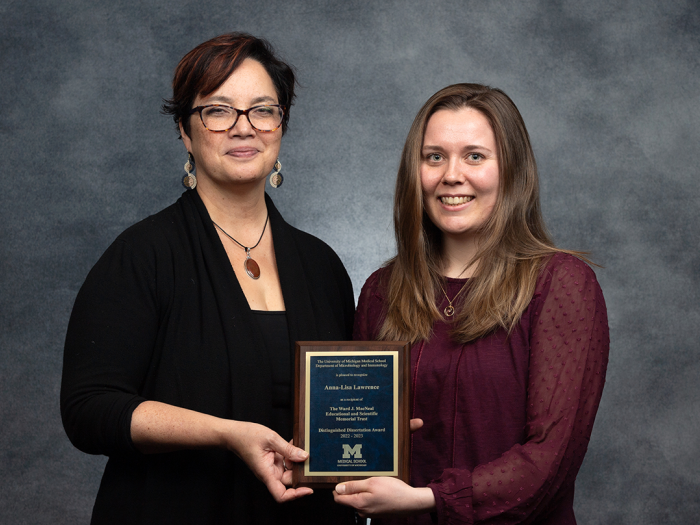Showing 16-30 of 1176 results

Department News
Rebecca Nause-Osthoff, MD, has received the University of Michigan Medical School Office of Graduate Medical Education's (GME) 2024 Faculty Equity and Inclusion Award.

Department News
Four Graduate Program in Immunology alumni participated in a panel discussion about their career paths.

Health Lab
Research published in PNAS examines how the bacteria Escherichia coli, or E. coli—responsible for most UTIs—is able to use host nutrients to reproduce at an extraordinarily rapid pace during infection despite the near sterile environment of fresh urine.

Health Lab Podcast
The NEPTUNE match study builds kidney atlas.

Department News
Drawn to Michigan Featuring Maya Bose -
From River Otters to DNA: Her Journey to Computational Medicine and Bioinformatics at U-M!

Health Lab
A study led by University of Michigan Health Rogel Cancer Center researchers identifies novel biomarkers in renal cell carcinomas.

Health Lab
Experts discuss pregnancy and heart health.

Michigan Medicine Presents
Join Dr. Deb Berman, assistant dean for admissions, and Carol Teener, director of admissions, along with two current medical students from the University of Michigan Medical School for answers to your questions about getting into medical school and more. The conversation ranges from GPAs and personal statements to the culture and experiences that make Michigan unique.

Health Lab
People over 50 of all backgrounds say they’re most concerned about various kinds of health costs affecting people their age, including insurance, prescriptions, medical care, dental care and home or longterm care.

Department News
This DEI grant will support the Girls Who Code Summer Camp in greater Detroit.

Department News
This M&I award recognizes outstanding dissertations.

Health Lab
Building a comprehensive human kidney cell and tissue catalog could help develop more treatments for kidney disease.

Health Lab
Experts in brain cancer outline current discoveries and offer a path of hope for glioblastoma treatment

Health Lab Podcast
A survey focused on how much people in their teens and early 20s know about periods and their experience and attitudes around “period poverty”.

Health Lab
Researchers improved memory and reduced neuroinflammation in a mouse model of Alzheimer’s Disease, suggesting another avenue for potential treatment.